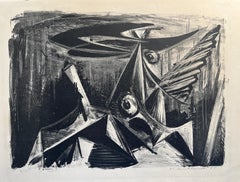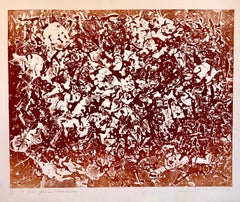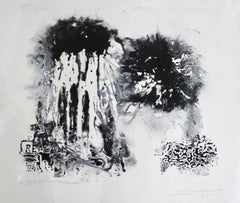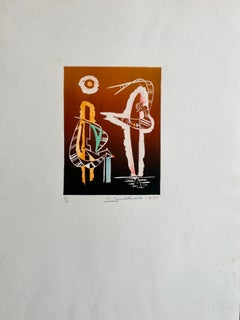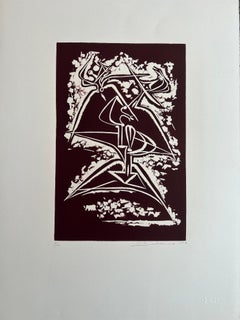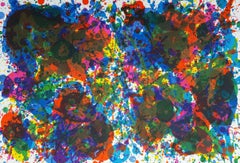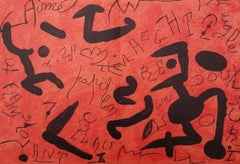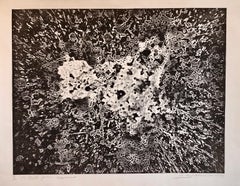Untitled, 1983, lithograph printed in sepia ink,
Hand signed and dated lower right, with the artist's chop mark lower left, inscribed
by artist. From a series of experimental abstract linocuts done in 1983. These are very small editions and were gifted to a friend of the artist. They are done on deckle edged French Arches Art paper. This one does not appear to be editioned and might be unique a monoprint or monotype.
Hans Gustav Burkhardt (1904 – 1994) was a Swiss-American abstract expressionist artist.
Hans Burkhardt was born in the industrial quarter of Basel, Switzerland. Captivated by Germanic art, he began dabbling in art in his spare time while learning how to decorate furniture in antique styles. He became foreman of the furniture company's decorating department. From 1925 to 1928 he attended the Cooper Union School of the Arts, where he befriended mentor Arshile Gorky and Willem de Kooning—sharing Gorky's studio from 1928 to 1937.
Burkhardt's paintings of the 1930s are part of the genesis of American abstract expressionism. In 1937 he moved to Los Angeles and represented the most significant bridge between New York and Los Angeles. His experimental investigative approach paralleled, and in many instances anticipated, the development of modern and contemporary art in New York and Europe including the work of Mark Rothko, Jackson Pollock, and Barnett Newman.
Burkhardt held his first solo exhibition in 1939 at Stendahl Gallery in Los Angeles, arranged by Lorser Feitelson, and, in response to the Spanish Civil War, he painted his first anti-war works. From the late 1930s he began to produce apocalyptic anti-war compositions, a theme which became particularly pronounced in an abstract expressionist style after the atom bomb was dropped on Hiroshima and Nagasaki at the end of the Second World War. In the years following an acclaimed (1945) solo exhibition at the Los Angeles County Museum, Burkhardt continued in his art to respond to WWII, in the aftermath of Gorky's suicide in 1948, Burkhardt delved into his grief and celebration of Gorky's life creating several versions of “Burial of Gorky” and a series entitled “Journey into the Unknown.” Burkhardt first visited Mexico in 1950, and spent the next decade living half of the year in and around Guadalajara. Strongly influenced by Mexican attitudes towards the dead, and by the country's colors, sensuality, and spiritual qualities, Burkhardt “painted the soul of Mexico” with Mexican themes and colors—especially those of burials and ceremonies surrounding death—permeating his abstract work. His Mexican work flirted with Surrealism although he was never really considered a Surrealist artist. Art critics of the time considered him a "great Mexican master” alongside Orozco, Diego Rivera, and Siqueiros, and Rufino Tamayo admired his work. Overall, in the 1950s Burkhardt held 23 solo exhibitions in Los Angeles and Mexico, and participated in group shows at over thirty museums worldwide. He was friends with June Wayne from Tamarind Press.
In the 1960s he produced paintings in protest against the Vietnam War, some of which incorporated the human skulls he had collected from Mexican graveyards. As art historian Donald Kuspit stated, Burkhardt was “a master—indeed the inventor—of the abstract memento mori.” In 1964, for the first time in forty years, Burkhardt returned to Basel, and began making annual summer visits where he became a friend of Mark Tobey—printing linocuts for the artist and collecting his work. In the 1970s Burkhardt continued his anti-war paintings—incorporating protruding wooden spikes into the canvas—while simultaneously painting abstractions of merging lovers and cityscapes during his summer visits to Basel. His “Small Print” (protesting smoking), “Graffiti,” and “Northridge” series demonstrate the evolution of his symbolism, and his “Desert Storms” series, in response to Iraq's invasion of Kuwait, was discussed by critic Peter Selz at a presentation at the International Congress of Art Critics Conference.
In the last decades of his life, Burkhardt's work had moved from images of imbalance to a study of human tragedy—which he embraced in an attempt to discover beauty and facilitate understanding. Critic Peter Frank called Burkhardt “…one of America’s most vital abstract expressionist painters, someone who took the seed of the movement and cultivated it a rather different way in very different soil.”
Burkhardt taught at numerous colleges and universities and retired as a professor emeritus from California State University, Northridge. In 1992 Burkhardt was honored as the recipient of the Lifetime Achievement Award by the American Academy and Institute of Arts and Letters’ Jimmy Ernst (son of Max Ernst) Award. Also in 1992, he established the Hans G. and Thordis W. Burkhardt Foundation. In 1993, the last year of his career, his final series “Black Rain” channeled pain and hardship, but provided poignant, symbolic beacons of hope and wishes for a better future for humanity. His unique role as an important American painter is affirmed by the constant interest and continuing reassessment afforded his work.
Select Solo exhibitions
1939: Stendahl Gallery, Los Angeles, March 27 – April 17
1945: Hans Burkhardt, Los Angeles County Museum of Art
1951: Museo de Bellas Artes, Guadalajara, Mexico: Exhibición de Pinturas Modernas; Comara Gallery, Los Angeles
1953: Fisher Gallery, University of Southern California, Los Angeles
1957: Pasadena Art Museum, California: Ten Year Retrospective, June 14 – July 14;
1968: San Diego Museum of Art:
Vietnam Paintings...
